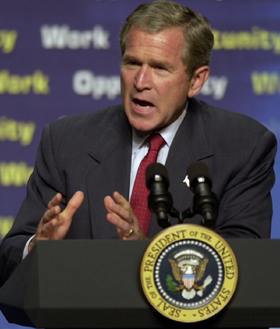WASHINGTON – President Bush rallied the nation after the Sept. 11 terrorist attacks, but he’s having a much tougher time battling the crisis of confidence that’s shaking the stock market and threatening to send the nation’s economy into a tailspin.
Unlike after Sept. 11, when Bush calmed fears and won widespread praise for his resolute response to terrorism, the president has been unable to convince average Americans and investors that everything will be okay on the economic front. Even some of Bush’s fellow Republicans say he has failed to take charge of a crisis that has left millions of Americans worried about their future.
“The Bush economic team has been very weak in responding to what I view as a financial crisis,” Stephen Moore, president of the Club for Financial Growth, an organization that lobbies for investment tax breaks. “The things that the president has been saying and proposing since the market meltdown began have not been reassuring to investors.”
The 500 stocks in the Standard & Poor’s index have lost more than one-third of their value since Bush took office, by far the worst slide in the first 18 months of any presidency since the benchmark was established in 1927.
In response, the public mood has turned sour. As recently as March, a Gallup poll found that 54 percent of Americans believed the economy was getting better. Now less than one-third feel that way.
“The public was thinking that recovery was at hand. Now those hopes have been dashed,” said Frank Newport, Gallup’s editor in chief.
As stock prices sank under the weight of the Enron and WorldCom accounting scandals, Bush repeatedly has given speeches emphasizing that the economy remains fundamentally sound. He has plenty of evidence to support his claim: Inflation, interest rates and even unemployment are low, for example, and economic growth and productivity rates remain strong.
But Bush’s message has fallen largely on deaf ears. The stock market slide overwhelmed public perception.
To be sure, presidents have little direct influence over market and economic trends, but at the root of today’s crisis is failing public confidence, and that can be susceptible to political leadership.
David Gergen, a former adviser to four presidents, urged Bush to steal a page from Franklin D. Roosevelt, who in his first inaugural address assured Americans shaken by the Great Depression that “the only thing we have to fear is fear itself.”
“Sadly, Bush so far has drawn more comparisons to Herbert Hoover than to FDR,” Gergen wrote in U.S. News and World Report. He was referring to FDR’s predecessor, who presided over the 1929 stock market crash and the ensuing onset of Depression.
“Just as FDR couldn’t wave a wand and end the Depression, Bush can’t order stock prices up. But as Roosevelt did _ and as Bush did in the war on terrorism _ he can show people that their government is fighting to protect them,” Gergen wrote.
Rather than follow FDR’s example, Bush’s leadership in this crisis more closely resembles Hoover’s assurance that “prosperity is just around the corner.”
Like Hoover, Bush is fundamentally opposed to government intervention in the marketplace.
“Markets take care of themselves,” White House spokesman Ari Fleischer said recently.
And unlike Ronald Reagan, who was dubbed “the Great Communicator,” Bush’s efforts to persuade the public to see today’s troubles his way have failed to make much of an impression. On July 9, when he delivered a high-profile speech about corporate responsibility on Wall Street, stock prices plummeted and kept falling for two weeks.
Despite Bush’s cheerleading about the nation’s fundamental economic strength, today most Americans (53 percent) believe that the country is on the wrong track, and only 37 percent think it is on the right one, according to a mid-July survey by Public Opinion Strategies, a Republican consulting firm in Alexandria, Va. The poll is being widely circulated in Washington political circles.
At the same time, voters do not seem to be blaming Bush. Although his popularity has slipped from the sky-high poll numbers that he racked up after Sept. 11, roughly two-thirds of Americans still approve of his overall performance in office, according to a flurry of recent polls.
One noted Democratic analyst draws a distinction between Bush’s personal popularity and public reaction to his leadership in this crisis.
“I think he’s a nice guy. I think people like him. I don’t think it’s any more complicated than that,” said Al From, director of the centrist Democratic Leadership Council. “But the right-track, wrong-track question is the important one to watch. Public perceptions lag. By 2004, people will be looking back to the Clinton years as the good old days.”
___
(EDITORS: The Gallup poll cited in graf 7 had an error range of plus or minus 3 percentage points. The Public Opinion Strategies poll cited in graf 21 had an error margin of plus or minus 3.5 percentage points. The Washington Post-ABC News poll cited in graf 25 had an error margin of plus or minus 3 percentage points.)
___
(c) 2002, Knight Ridder/Tribune Information Services.





















































